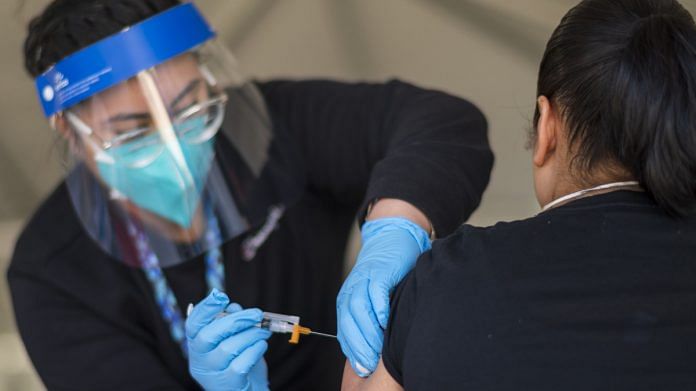
New Delhi: Scientists have found that a single dose of an mRNA Covid vaccine is sufficient to induce a robust, specific, and long-lasting immunity among those who have already been infected with the SARS-CoV-2 virus once, with the second dose not benefitting recovered Covid patients.
Researchers from the University of Pennsylvania studied 36 people who had never had Covid, and 11 people who had recovered from the disease prior to vaccination, to reach the conclusion.
The findings, published in the journal Immunity on 12 August, looked at the T-cell responses in people before and after they had received both vaccine doses. T cells are a type of white blood cells that form a key part of the immune system. T cells help kick-start the process that helps the body produce antibodies, and also ‘remember’ the pathogens they encounter.
This ‘memory’ helps the body quickly launch an immune response when it next encounters the same pathogen.
The study only included people who received Pfizer (BNT162b2) or Moderna (mRNA-1273) mRNA vaccines and did not look at the effect of inactivated adenovirus vaccines, such as the AstraZeneca vaccine, on those who had had Covid.
Also read: 3rd wave could be worse than 2nd if vaccinations don’t pick up, bring 6L cases/day, govt warned
‘Little effect of booster dose on Covid recovered’
The researchers found that vaccination induced rapid T cell responses in participants, both those who had had Covid and those who hadn’t.
By studying different types of T cell responses in the participants, the team found that there was a distinct difference in the immune responses among people who had or had not been infected with SARS-CoV-2 before the vaccination.
The study concluded that while booster vaccination improved T cell responses in participants who had not been infected with SARS-CoV-2 before vaccination, the second dose had little effect in individuals who had previously been infected with SARS-CoV-2.
The researchers added that though they were yet to conduct follow-up studies to determine how long the vaccine-induced immunity lasted, their observations indicate that T cell responses will be long-lived and capable of fighting off future infections.
They added that the vaccine-elicited immune response has the “key hallmarks of long-term antiviral immunity”. This, the researchers said, is likely to provide lasting protection against SARS-CoV-2 infection.
(Edited by Poulomi Banerjee)
Also read: Covid vaccine efficacy dropped to 66% as delta variant became dominant, says US CDC

COMMENTS